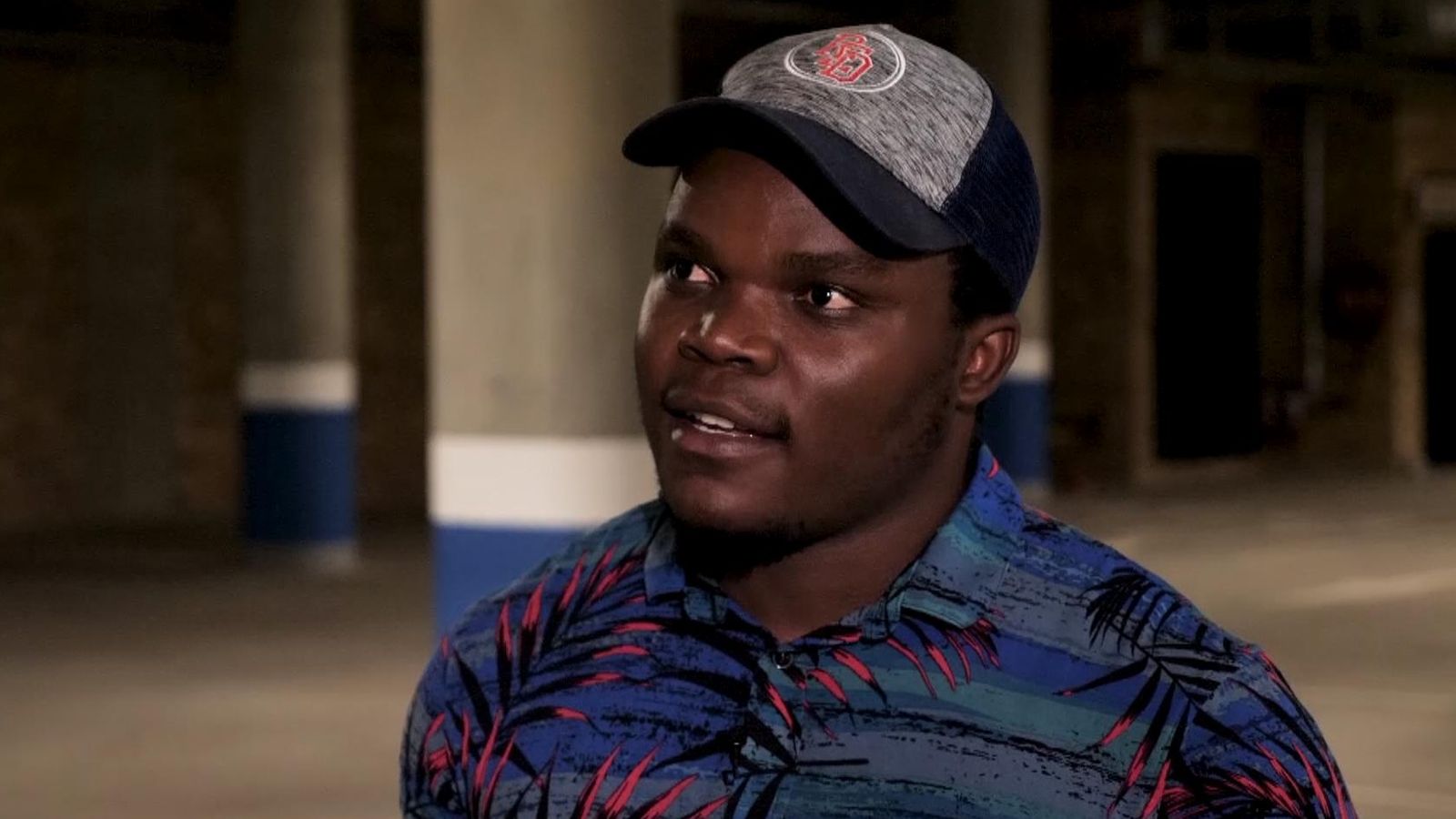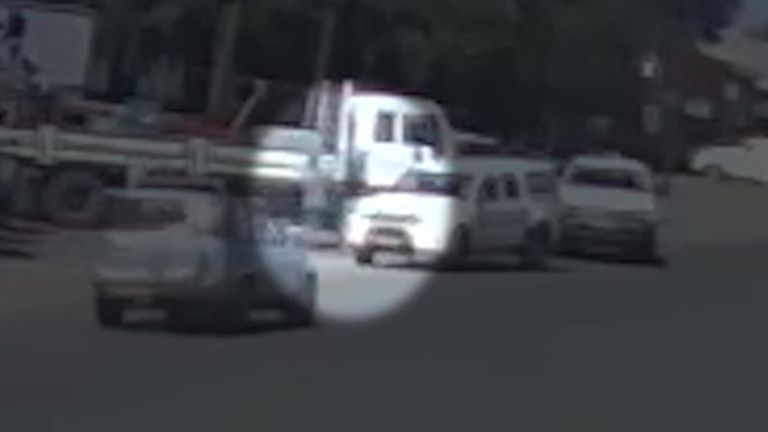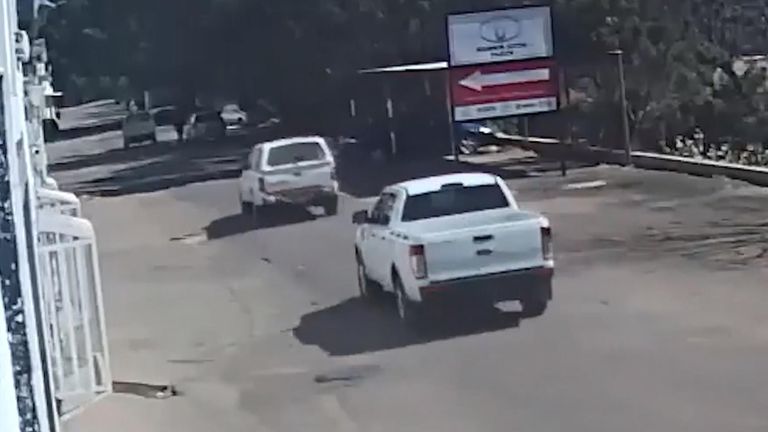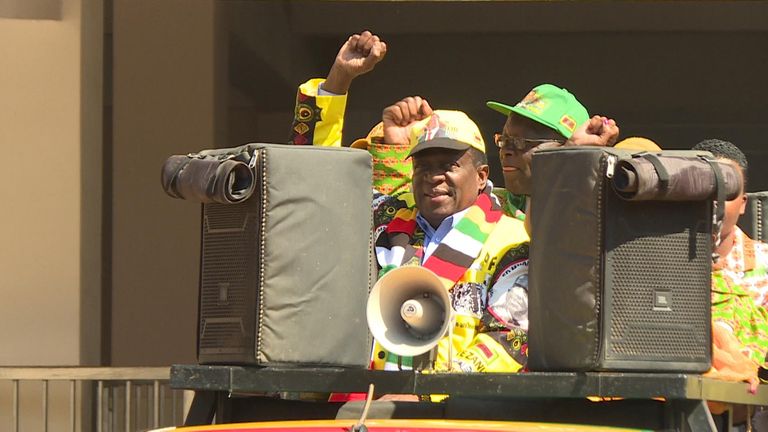Tawanda Muchehiwa has spent the last few months living in the shadows in a large African city.
He rarely goes outside and when he does, he says he is prone to panic attacks and bouts of body-shredding paranoia.
“Some days I feel I am ok, then the other day (I am) breaking down. I am shaking you know, it is like a rollercoaster. It’s ups and downs. I am so traumatised, I think I can say,” he says.
The 22-year old university student was utterly unprepared for the moment at the end of July when he was abducted by 15 to 20 men.
The experience has changed his life, challenged his thinking, and placed him on a new path, dominated by the search for accountability.
Mr Muchehiwa was waiting for his nephews in the car park of a shop called Tile and Carpet in the Zimbabwean city of Bulawayo, when a group of men, thought to be members of the security services, pulled up and took him away.
He was stuffed in the back of a vehicle and driven round the corner, then transferred into the back of a Ford Ranger pick-up by his abductors. Three days of physical and mental torture, and sexual humiliation, would follow.
A local lawyer, called Nqobani Sithole, may have saved his life. He got a court order, instructing Zimbabwe‘s police force (ZRP) and the criminal investigation department (CID) to find and return him.
Mr Muchehiwa was dumped on the side of the road, sporting horrific flesh wounds, damaged kidneys, and a very different understanding of the world.
He says he is not exactly sure why he was taken. His political sympathies lie with the opposition MDC-Alliance, but he is not a party member.
His interrogators repeatedly asked about his uncle, Mduduzi Mathuthu, who runs a website which publishes articles and investigations which are critical of the government.
However, he could not provide the information – for example on Mathuthu’s sources – that they were seeking.
Seeking sanctuary and treatment for the damage he has suffered, he found safety in neighbouring South Africa.
He got himself a place to stay in a scruffy, unlit corner, but has had to leave this hiding spot on occasion. Nightmares and suicidal thoughts have robbed him of his sleep and a team at a psychiatric clinic are trying to help him.
In recent weeks, Mr Muchehiwa has started thinking about his future and the prospects for young Zimbabweans like him.
“You know, my abduction is just one in a thousand and something must be done to stop the Zimbabwe government,” he says.
“They know exactly who abducted me, they know the perpetrators, they know the people involved, they have all the details in black and white.”
Civil rights organisations and human rights lawyers say dozens of government critics, union officials, and political activists have been abducted in Zimbabwe over the last few years.
Yet the incident involving Tawanda Muchehiwa is different in one crucial respect – it is the first abduction to be caught on CCTV.
A series of street-side cameras captured the operation outside Tile and Carpet, with one camera even capturing the licence plate number on the Ford Ranger pick-up used by a member of the abduction team.
The vehicle registration, AES 2433, was traced to a car rental company called Impala, and activists have called on the firm to release the name of the person who rented it.
But Impala has repeatedly declined.
When the head of Zimbabwe’s national student union, Takudzwa Ngadziore, called on Impala to release the information in a press conference held outside one of their branches, he was attacked and beaten by unknown assailants.
Later, the ZRP charged Mr Ngadziore with “promoting public violence” and held him in custody for five weeks.
Mr Muchehiwa, along with his lawyer, have also tried to get the name, obtaining an order from Zimbabwe’s High Court which instructed Impala to provide it.
But Impala’s lawyers said they could not hand it over because police had already “seized” the relevant file.
Mr Muchehiwa says this explanation borders on the absurd.
“The sheriff went there to collect the documents and Impala said they no longer have the documents – you know it is just so ridiculous,” he says.
“How can a company like Impala fail to have maybe some back-up copies of that information? You know that your car was used to commit a crime against humanity… how can (they) say, we are going to give the information to the police, and the same ZRP who are implicated in my abduction?”
Sky News has discovered that the man who runs Impala, Thompson Kanganwirai Dondo, is a fugitive from British justice.
He ran a nursing agency in the UK, but left the country after he was charged with immigration offences in 2007.
In a statement, Cleveland Police told Sky News: “Our records confirm that this individual is wanted on warrant for failure to appear at court in 2007 for alleged immigration offences.
“If he attempted to re-enter the UK from abroad, he would be placed before the courts.”
Sky News sought a response from Mr Dondo and a company spokesperson said: “The CEO has indicated that he legally left the UK as the court case dragged on for more than 13 months.
“He legally left the UK as he had no means to sustain his livelihood following the closure of his company.”
In respect of the name of the person who hired the Ford Ranger pick-up, Impala said: “The vehicle with the number plate AES 2433 had been hired from our company by an individual whose name, together with all required documents, we forwarded to police to facilitate investigations on the matter.”
As Tawanda Muchehiwa tries to pick up the pieces of his life in a battered-looking dwelling in South Africa, he says he is re-evaluating what to do with his life.
He says he no longer wants to finish his media studies degree. It would better to study the law he argues, if he wants to learn how to protect it.
“Three days of being tortured, three days not knowing what is going to happen to you, people discussing about how they are going to kill you, in a way it really changes your mind, and I think in my case, it made me to see that there is nothing to live for if you don’t have freedom,” he says.
The Zimbabwean government has not commented on Tawanda Muchehiwa’s claims, although a spokesman for President Emmerson Mnangagwa has accused people of faking such incidents in order to seek funds from western donors.
Furthermore, the government is proposing legislation which would criminalise those who make unproven allegations of abductions and torture.
But this young exile will not be silenced.




